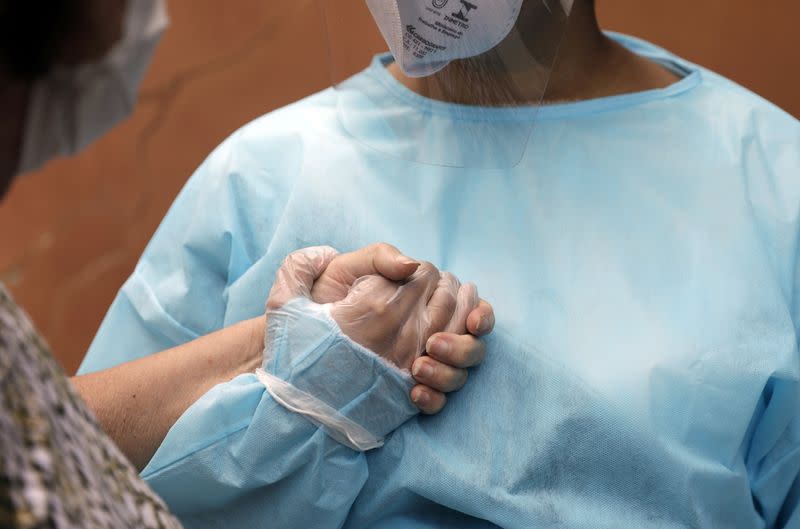Respiratory therapist struggles to catch her own breath after COVID-19

By Ricardo Moraes and Marcelo Rochabrun
RIO DE JANEIRO (Reuters) - Ana Carolina Xavier was helping as many as six coronavirus patients a day to slowly recover lung capacity when she began worrying about her own breathing.
As the 33-year-old physical therapist was working a holiday shift in a Rio de Janeiro field hospital, she felt her heart pumping, head throbbing and lungs struggling to expand.
A scan of her lungs showed the kind of damage she had seen wreaking havoc on her patients, many of them young and otherwise healthy - but now struggling for months to catch their breath.
"This disease – I've never seen something that destroys the lungs in the same way. There's no point of comparison," Xavier said. "Even talking can become a struggle."
Weeks after her recovery, Xavier still takes pauses during interviews to rest and recover. She complains of endless headaches, and the oxygen levels in her blood occasionally dip.
Frontline health workers such as Xavier are sounding the alarm about lingering respiratory issues that may come to haunt a generation of COVID-19 patients.
Many are young or middle-aged adults who had moderate symptoms and never went on ventilators, yet their daily lives are no longer the same. Despite these lasting, perhaps chronic conditions, patients appear in many government statistics simply as "recovered."
"One thing we have begun to notice is a fatigue syndrome that patients apparently cannot overcome, even a while after recovering from COVID-19," said pulmonologist Lucia Viola, of Colombia's Fundacion Neumologica. "I've had patients who a month and a half after recovering, still feel tired."
In May, experts wrote a 'call to arms' in The Lancet medical journal to raise awareness about recovered coronavirus patients developing pulmonary fibrosis - irreversible scarring of the lungs that causes fatigue and shortness of breath.
At least two patients have undergone coronavirus-related lung transplants in the United States, including a 28-year old. Xavier said several of her patients appear to have developed fibrosis.
She now knows firsthand how scary it can feel to be out of breath just from making coffee or taking a shower. Some of her patients complained of feeling exhausted after walking up the stairs or rolling around in bed.
"It feels like the air is never going to fill up in your lungs again," Xavier said.
SINGING WITHOUT AIR
Marcia Guimaraes, a 40-year-old samba singer, was used to running up to 10 kilometers per day in hilly Rio. To her surprise, she recently found herself short of breath in the middle of giving a voice lesson.
"There were some long musical phrases that I used to sing easily in one breath and then I couldn't do it anymore. It's what shook me the most," recalled Guimaraes.
Guimaraes tested positive for the coronavirus. She was fatigued just from walking between her bedroom and kitchen and felt like sleeping all the time.
Slowly, with Xavier's help, she has regained much of her former strength.
"Now I can sing," Guimaraes said. "It's not like it used to be, but I'm getting better every day."
Born in a small rural town, Xavier was drawn to physical therapy after seeing it help her grandfather, who suffered from Parkinson's Disease.
Her respiratory therapy has had to adapt to the pandemic.
Ordinarily, Xavier said, respiratory therapy would involve deep breaths and exhalation. But studies quickly flagged the risk that COVID-19 patients would spread the virus more widely with heavy breathing exercises.
Xavier has resorted to a passive form of therapy that is common in Brazil. She raises patients' arms while monitoring their breathing and oxygen levels, then lays them belly-down and massages their back muscles to help their diaphragms contract.
"It's like conducting an orchestra," Xavier said. "If one muscle falls 'out of tune,' the orchestra loses its synergy. It's the same with breathing."
Xavier said her work has been transformed by the experience of falling sick.
When she first started working with COVID-19 patients, she felt like an athletic coach pushing patients to keep working through the exhaustion. Now she knows when to let them rest.
"To understand what the patient is feeling, it changed me."
(Reporting by Ricardo Moraes and Marcelo Rochabrun; Editing by Brad Haynes and Rosalba O'Brien)


